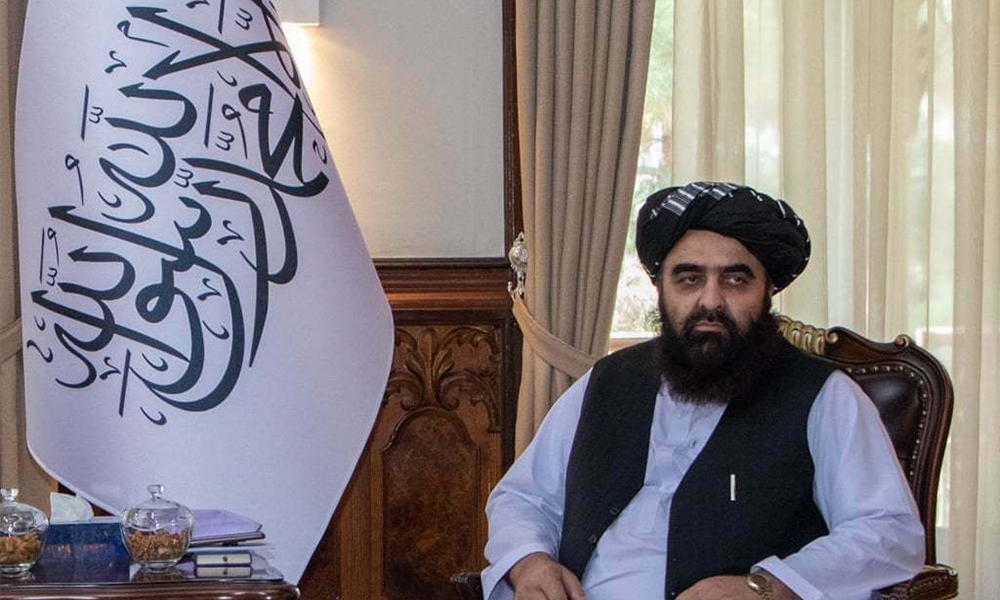Latest News
Afghanistan dedicated to protecting rights of all ethnic groups, women: Muttaqi

The interim government of Afghanistan has obtained achievements in protecting the rights of all ethnic groups as well as women and children since its establishment, said Afghanistan’s acting Foreign Minister Amir Khan Muttaqi quoted by Reuters on Wednesday.
Issues involving building an inclusive government and protecting the rights of ethnic groups as well as women and children are of great concern to the international community since the Islamic Emirate of Afghanistan [IEA] announced the formation of Afghanistan’s interim government in September, which had just walked out of the quagmire of long-time war.
Muttaqi told the Chinese national broadcaster China Media Group (CMG) in an exclusive interview that the interim government has already done so on both accounts.
“If an inclusive government means to contain all ethnic groups, then the Afghanistan interim government has already done so with none of the nationalities being excluded. Our cabinet includes members of the Tajiks, Uzbeks, Pushtuns, and many others. If an inclusive government means to cover all regions, then we have representatives from every province across the country including those from Panjshir Province, Badakhshan Province, Faryab Province, Kandahar Province, and Nangahar Province,” he said.
According to Reuters during the IEA’s previous ruling in Afghanistan from 1996-2001, women and girls were forbidden from education.
It wasn’t until the 2001 U.S.-led invasion that women and girls began attending schools and universities.
With the fall of the IEA, more schools opened and female literacy reached 30 percent by 2018, according to the United Nations Educational Scientific and Cultural Organization (UNESCO), read the report.
The acting Foreign Minister said the interim government was now making efforts to push for progress in female education.
“As we all know, before Taliban [IEA] entered Kabul, schools here were shut down due to the novel coronavirus. While after we came here, everything started from the beginning. Currently, all primary and middle school male students have resumed classes. Female students below grade six in all provinces have resumed classes and those above grade six in some regions also have gradually resumed classes. That means we have made some progress in that aspect, instead of just standing still,” he said.
Latest News
Girls’ education is a ‘vital issue’ for Afghanistan: Karzai

Former president Hamid Karzai said in a meeting with Iran’s ambassador and special representative, Hassan Kazemi Qomi, that education of girls was a “vital issue” for Afghanistan.
Karzai said he appreciated Iran’s cooperation and its standing with the Afghan people, especially Iran’s contributions to education in Afghanistan.
During the meeting, Karzai said peace and stability in the region are in the interest of all regional countries.
Latest News
Uzbekistan’s humanitarian aid arrives in Balkh

A shipment of humanitarian aid from Uzbekistan was handed over on Thursday to the local officials of Balkh province in the trade port of Hairatan.
Local authorities said the aid, which includes flour, oil, wheat, sugar and meat, has been handed over by Uzbekistan’s Surkhandarya governor to the governor of Balkh.
The governor of Surkhandarya stated the purpose of sending this aid was to support the people of Afghanistan and stressed the need for the development of good relations between the two countries.
Latest News
Afghanistan’s problems caused more damage to Pakistan than 3 wars with India: Durrani

Islamabad’s special envoy for Afghanistan Asif Durrani said on Wednesday that Pakistan has suffered more due to Afghanistan’s internal situation than Pakistan has suffered in three wars with India in terms of blood spilt and finances drained.
Durrani said at a one-day International Conference titled “Pakistan in the Emerging Geopolitical Landscape”, which was organized by the Institute of Strategic Studies Islamabad (ISSI) and the German Friedrich Ebert Stiftung (FES), that over 80,000 Pakistanis died in the two decades of the War on Terror and that his country was still counting its dead and injured.
“After the withdrawal of NATO forces, it was hoped that peace in Afghanistan would bring peace to the region. However, such expectations were short-lived,” he said.
He also stated that attacks by the Tehreek-e-Taliban Pakistan (TTP) militant group on Pakistan’s border areas increased by 65 percent, while suicide attacks increased by 500 percent.
“The TTP’s enhanced attacks on Pakistan while using Afghan soil have been a serious concern for Pakistan. Another worrying aspect is the participation of Afghan nationals in these attacks,” he said.
Durrani also said Pakistan had suffered geopolitically since the Soviet Union invaded the neighboring country.
“The post-9/11 world order has negatively impacted Pakistan. Apart from losing 80,000 citizens’ lives, including 8,000 law enforcement agency personnel, the country’s economic opportunity cost is estimated at $150 billion,” Durrani said.
Talking about the future outlook for Pakistan in the regional context, Durrani said that while “our eastern neighbor is likely to continue with its anti-Pakistan pursuits, the western border poses an avoidable irritant in the short to medium term.”
However, he said Pakistan can overcome its difficulties with Afghanistan, including the TTP challenge.
-

 Latest News4 days ago
Latest News4 days agoPakistan’s frontiers minister stresses ‘dignified’ return of Afghan refugees
-

 Regional3 days ago
Regional3 days agoIranian president lands in Pakistan for three-day visit to mend ties
-

 Climate Change4 days ago
Climate Change4 days agoMassive river flooding expected in China, threatening millions
-

 Latest News2 days ago
Latest News2 days agoRashid Khan named AWCC’s brand ambassador
-

 Latest News5 days ago
Latest News5 days agoChinese keen to invest in Panjshir-Kabul water conduit project
-

 World4 days ago
World4 days agoTwo Japan navy helicopters crash, one body found, 7 missing
-

 Sport3 days ago
Sport3 days agoKolkata beat Bengaluru by one run in IPL as Kohli fumes at dismissal
-

 Sport3 days ago
Sport3 days agoACL: Aino Mina 3-0 Istiqlal Kabul; Attack Energy 3-0 Khadim
























